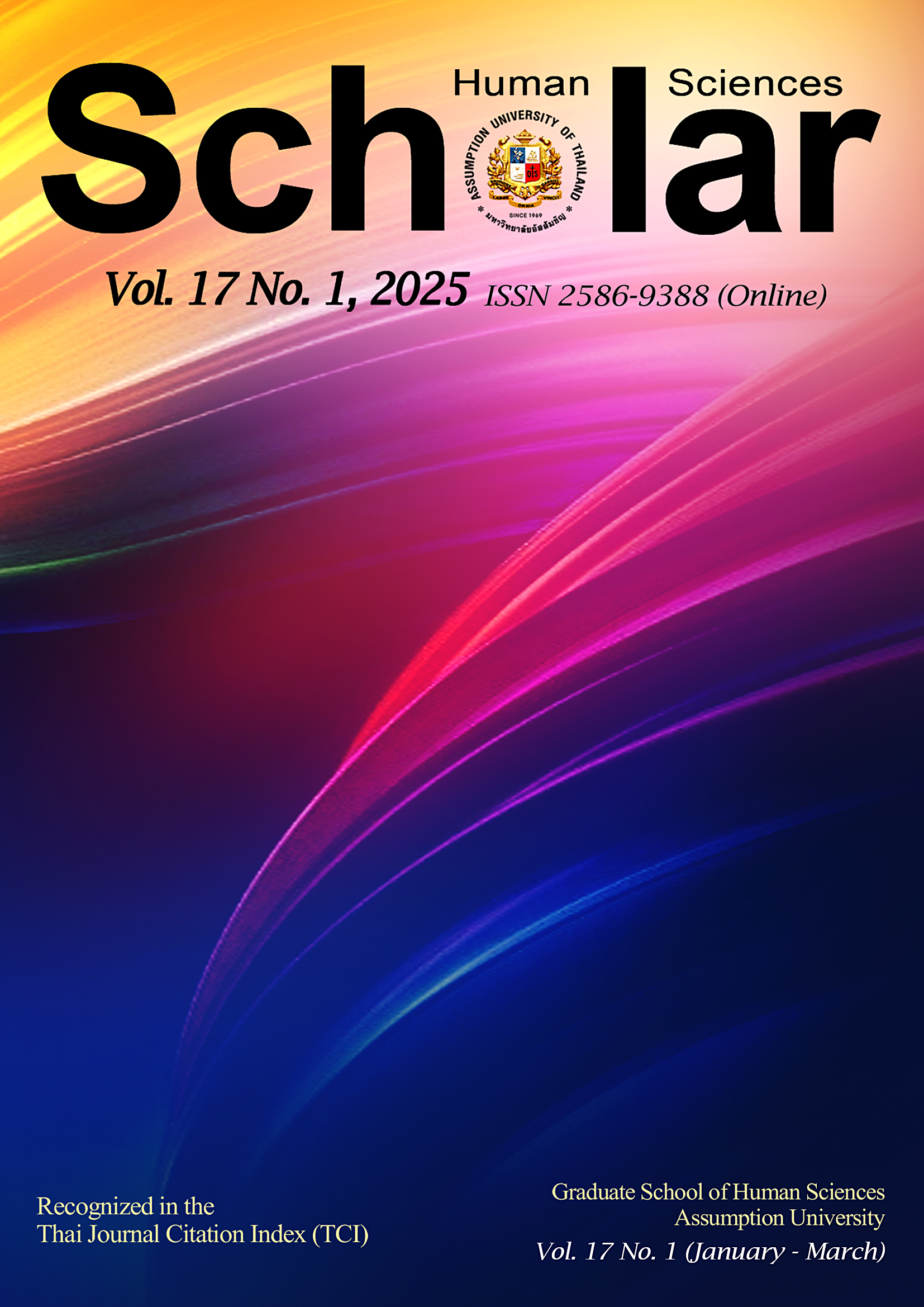EDITORIAL
Abstract
The Scholar: Human Sciences, a journal encompassing the fields of humanities and social sciences, has earned acclaim in the Thailand Citation Index (TCI) as a prominent publication since 2015. It currently holds the esteemed TCI: TIER1 classification. We take great pride in presenting the latest issue, which features a collection of manuscripts that have undergone rigorous evaluation. Each submission has been meticulously reviewed through a blinded review process by three specialized reviewers from different institutions, both internal and external to the authors. This peer-reviewed accreditation ensures the scholarly quality and integrity of the published articles.
This issue covers thirty articles. The first article titled “Blended Learning Satisfaction Among Art Students in Local Universities in Sichuan, China” explored the influencing factors of art students' satisfaction with blended learning in local colleges in Sichuan.
The second article titled “An Analysis of Influencing Factors of Entrepreneurial Intentions and Behavior of Undergraduate Students at a University in Guangxi, China” aims to examine the factors that influence undergraduate students' entrepreneurial intentions and behavior at Guangxi University of Science and Technology.
The third article titled “Measuring Self-Efficacy and Job Satisfaction of Full-Time Art Teachers in Chengdu, China” aims to investigate the factors influencing the self-efficacy and job satisfaction of full-time art teachers in Chengdu, China.
The fourth article titled “Factors Underlying Behavior Intention to Use Online Education of Art College Students in Xi’an, China” aims to investigate the key factors affecting the online education behavior intention of fine arts students in three specific universities in Xi'an, China.
The fifth articled titled “Measuring Satisfaction and Behavioral Intention to Use Online Learning Among Junior Students in a Public University in Yunnan, China” investigates factors impacting third-year student satisfaction and behavioral intention to use online learning in a public university in Yunnan, China.
The sixth article titled “Factors Impacting Behavioral Intention to Use Online Learning of Junior College Students in a Private Vocational University in Chengdu, China” aims to determine factors impacting behavioral intention of students painting majors in a private vocational university in Chengdu, China.
The seventh article titled “Factors Impacting Intention to Use and Satisfaction with Blended Learning of Students in Business English Major in Guangdong, China” investigates the factors impacting intention to use and satisfaction with blended learning business of students in business English major in Guangdong, China.
The eighth article titled “Assessment of Satisfaction and Continuance Intention of Art Major Students at Sichuan Fine Arts Institute towards Cloud-based E-learning Systems” investigates the determinants of satisfaction, and continuance intention to use CELS among undergraduate students specializing in art at the Sichuan Fine Arts Institute (SFAI) in Chongqing, China.
The ninth article titled “Exploring Antecedents of Japanese Major Students’ Behavioral Intention to Use Japanese Language Learning Apps in Chengdu, China” investigates the determinants influencing the behavioral intention of Japanese major students to utilize Japanese language learning apps in Chengdu, China.
The tenth article titled “Determinants of Student Satisfaction with Online Courses Delivered via Cloud-Based Platforms in Educational and Training Institutions, Chongqing, China” aims to investigate the influencing factors that affect the students’ satisfaction cloud-based online courses of educational and training organizations among college students in Chongqing, China.
The eleventh article titled “Factors Impacting Satisfaction and Continuance Intention with E-Learning of Students Majoring in Radio and Television Director at Private Art Schools in Western China” study aims to explore the factors impacting student satisfaction and continuance intention to use online learning among Radio and Television Directing majors in private art schools in western China.
The twelfth article titled “Measuring Determinants of Satisfaction with Online Courses of Adult Higher Education Among Junior College Students in Chengdu, China” aims to investigate adult higher education junior college students' levels of satisfaction with online course instruction in Chengdu.
The thirteenth article titled “Factors Impacting Undergraduate’s Attitude, Use and Satisfaction Towards Social Media During COVID-19 in Shanghai Institute of Visual Art, China” investigated the variables influencing undergraduates’ attitudes toward, use, and contentment with social media during COVID-19 at the Shanghai Institute of Visual Art.
The fourteenth article titled “Investigating Factors Influencing Athletes' Intention to Use Timing and Scoring Systems: A Case Study of the 2023 Track and Field League in Northern China” explores the factors influencing athletes’ satisfaction, and behavioral intention to use the timing and scoring system in 2023 Athletics Association Traditional Sports Programme School Athletics League (North Zone) in China.
The fifteenth article titled “Factors Influencing on Gen X Consumers’ Attitude and Purchase Intention of Wine Products in Sichuan, China” paper aims to evaluate the influence on wine Gen X consumers’ attitudes and purchase intentions in Sichuan, China.
The sixteenth article titled “Factors Influencing College Students’ Use Behavior of Online Learning Platforms in Sichuan, China” investigates the factors that affected the college students’ use behavior when applying to online learning platforms in Sichuan, China, including perceived ease of use, usefulness, attitude, social influence, facilitating conditions, behavioral intention, and use behavior.
The seventeenth article titled “Predicting Social Science Undergraduate’s Behavioral Intention to Use Online Library’s Full-Text Resources in Chengdu” analyzed the factors affecting the behavioral intention to use of full-text digital library resources by social sciences students to provide a new perspective for constructing digital libraries in Chinese colleges and universities.
The eighteenth article titled “Developing Students’ Self-Leadership and Students’ Creativity in Zhanjiang, China” investigates the influence of five independent variables (Behavior Focused, Natural Reward, Constructive Thought, Self-Punishment, and Self-Talk) on two dependent variables (Self-Leadership and Creativity).
The nineteenth article titled “Exploring the Determinants of Postgraduate Students' Satisfaction and Loyalty Toward Art Museums in Chengdu, China” studies the determinants of university students' satisfaction and loyalty toward art museums in Chengdu, China.
The twentieth article titled “An Investigation on Science Students’ Behavioral Intention and Self-Learning Attitude of Internet Base E-Learning in Chengdu, China” investigates the factors influencing the behavioral intention and attitude toward self-learning among science students in Chengdu, China.
The twenty-first article titled “The Influencing Factors of Satisfaction with Learning Management System of Students Majoring in Environmental Design: A Case Study of Normal Universities in Sichuan Province” aimed to explore the satisfaction and attitude of environmental design students in Sichuan Normal universities when using the superstar learning system in a blended learning environment.
The twenty-second article titled “A Quantitative Approach Assessing Students' Attitude Towards Entrepreneurship and Entrepreneurial Intentions in a Private University in Zhanjiang, China” proposes hypothetical relationships among variables through previous theories and literature to investigate the factors impacting attitudes towards entrepreneurship and entrepreneurial intentions of students in a private university in Zhanjiang, China.
The twenty-third article titled “Determinants of Purchase Intent and Behavior of Male Generation Y Consumers in Fast Fashion Sector in Chengdu, China” establishes a conceptual framework that elucidates the interconnections among brand, perceived quality, attitude, loyalty, trust, purchase intention, and purchase behavior.
The twenty-fourth article titled “A Study on the Driving Factors of Satisfaction and Continuous Intention to Use Online Learning Among Vocational Students in China” aims to explore the factors influencing the online learning satisfaction and continuous intention of the students majoring in folk music and dance at Rongjiang Secondary Vocational School, China.
The twenty-fifth article titled “Influential Factors on the Quality of E-banking Services and Loyalty Among University Students in Baoshan, China” examines the factors impacting e-banking service quality and loyalty for university students in Baoshan, China.
The twenty-sixth article titled “Factors Influencing the Behavioral Intention of Business Major Undergraduates in Blended Learning: A Case of a Private University in Chengdu, China” promotes the development of blended learning, university administrators, teachers, and students need to consider various elements of the adoption of blended learning among students.
The twenty-seventh article titled “Measuring Satisfaction and Purchase Intention of Art Major Students Towards Mobile Games: A Case of Public Universities in Chongqing, China” explores the factors impacting the purchase intention of mobile games for art major students in Public Universities in Chongqing, China.
The twenty-eighth article titled “Measuring College Graduates’ Career Satisfaction in Hangzhou, China” aims to explore the key influences on the career satisfaction of Hangzhou college graduates.
The twenty-ninth article titled “Factors Influencing Students’ Satisfaction and Continuance Intention to Use B2C Online Shopping Platform in a University in Sichuan, China” aims to explore the factors that influence the satisfaction and continuous intention of Chinese college students using B2C shopping platforms.
The thirtieth article titled “Semantics of Cardinal Directions in Benguet Cultural Practices” aimed to identify the cultural practices of Indigenous Peoples in Benguet that incorporated cardinal directions and revealed the meanings of the cardinal directions in these cultural practices.
Downloads
Published
How to Cite
Issue
Section
License
Copyright (c) 2025 Rawin Vongurai

This work is licensed under a Creative Commons Attribution 4.0 International License.
The submitting author warrants that the submission is original and that she/he is the author of the submission together with the named co-authors; to the extend the submission incorporates text passages, figures, data, or other material from the work of others, the submitting author has obtained any necessary permission.
Articles in this journal are published under the Creative Commons Attribution License (CC-BY What does this mean?). This is to get more legal certainty about what readers can do with published articles, and thus a wider dissemination and archiving, which in turn makes publishing with this journal more valuable for you, the authors.




